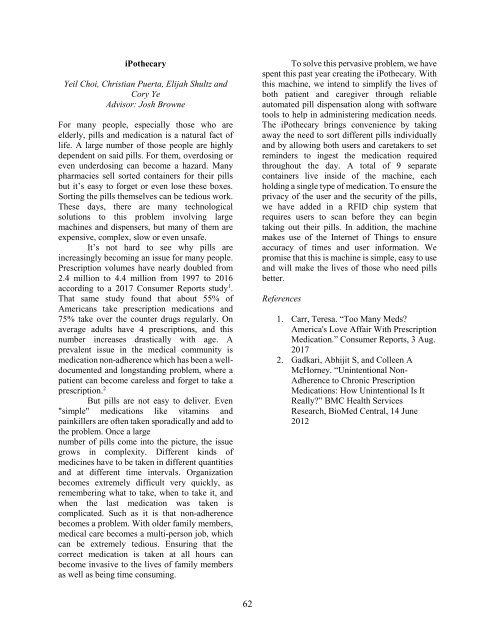Senior Design Expo 2019
The Senior Design Expo, held annually in May at Columbia University, is an opportunity for Columbia Engineering students to showcase what they have learned in their foundational math and science courses together with their engineering courses in innovative, creative, and purposeful designs and prototypes. Each year the Expo showcases more than 60 projects across all nine departments. Projects have included cutting-edge robotics, the New York City subway system, language technology, proposals for bridges to span the Hudson river, and much more.
The Senior Design Expo, held annually in May at Columbia University, is an opportunity for Columbia Engineering students to showcase what they have learned in their foundational math and science courses together with their engineering courses in innovative, creative, and purposeful designs and prototypes. Each year the Expo showcases more than 60 projects across all nine departments. Projects have included cutting-edge robotics, the New York City subway system, language technology, proposals for bridges to span the Hudson river, and much more.
Create successful ePaper yourself
Turn your PDF publications into a flip-book with our unique Google optimized e-Paper software.
iPothecary<br />
Yeil Choi, Christian Puerta, Elijah Shultz and<br />
Cory Ye<br />
Advisor: Josh Browne<br />
For many people, especially those who are<br />
elderly, pills and medication is a natural fact of<br />
life. A large number of those people are highly<br />
dependent on said pills. For them, overdosing or<br />
even underdosing can become a hazard. Many<br />
pharmacies sell sorted containers for their pills<br />
but it’s easy to forget or even lose these boxes.<br />
Sorting the pills themselves can be tedious work.<br />
These days, there are many technological<br />
solutions to this problem involving large<br />
machines and dispensers, but many of them are<br />
expensive, complex, slow or even unsafe.<br />
It’s not hard to see why pills are<br />
increasingly becoming an issue for many people.<br />
Prescription volumes have nearly doubled from<br />
2.4 million to 4.4 million from 1997 to 2016<br />
according to a 2017 Consumer Reports study 1 .<br />
That same study found that about 55% of<br />
Americans take prescription medications and<br />
75% take over the counter drugs regularly. On<br />
average adults have 4 prescriptions, and this<br />
number increases drastically with age. A<br />
prevalent issue in the medical community is<br />
medication nonadherence which has been a welldocumented<br />
and longstanding problem, where a<br />
patient can become careless and forget to take a<br />
prescription. 2<br />
But pills are not easy to deliver. Even<br />
"simple" medications like vitamins and<br />
painkillers are often taken sporadically and add to<br />
the problem. Once a large<br />
number of pills come into the picture, the issue<br />
grows in complexity. Different kinds of<br />
medicines have to be taken in different quantities<br />
and at different time intervals. Organization<br />
becomes extremely difficult very quickly, as<br />
remembering what to take, when to take it, and<br />
when the last medication was taken is<br />
complicated. Such as it is that non-adherence<br />
becomes a problem. With older family members,<br />
medical care becomes a multi-person job, which<br />
can be extremely tedious. Ensuring that the<br />
correct medication is taken at all hours can<br />
become invasive to the lives of family members<br />
as well as being time consuming.<br />
To solve this pervasive problem, we have<br />
spent this past year creating the iPothecary. With<br />
this machine, we intend to simplify the lives of<br />
both patient and caregiver through reliable<br />
automated pill dispensation along with software<br />
tools to help in administering medication needs.<br />
The iPothecary brings convenience by taking<br />
away the need to sort different pills individually<br />
and by allowing both users and caretakers to set<br />
reminders to ingest the medication required<br />
throughout the day. A total of 9 separate<br />
containers live inside of the machine, each<br />
holding a single type of medication. To ensure the<br />
privacy of the user and the security of the pills,<br />
we have added in a RFID chip system that<br />
requires users to scan before they can begin<br />
taking out their pills. In addition, the machine<br />
makes use of the Internet of Things to ensure<br />
accuracy of times and user information. We<br />
promise that this is machine is simple, easy to use<br />
and will make the lives of those who need pills<br />
better.<br />
References<br />
1. Carr, Teresa. “Too Many Meds?<br />
America's Love Affair With Prescription<br />
Medication.” Consumer Reports, 3 Aug.<br />
2017<br />
2. Gadkari, Abhijit S, and Colleen A<br />
McHorney. “Unintentional Non-<br />
Adherence to Chronic Prescription<br />
Medications: How Unintentional Is It<br />
Really?” BMC Health Services<br />
Research, BioMed Central, 14 June<br />
2012<br />
62








